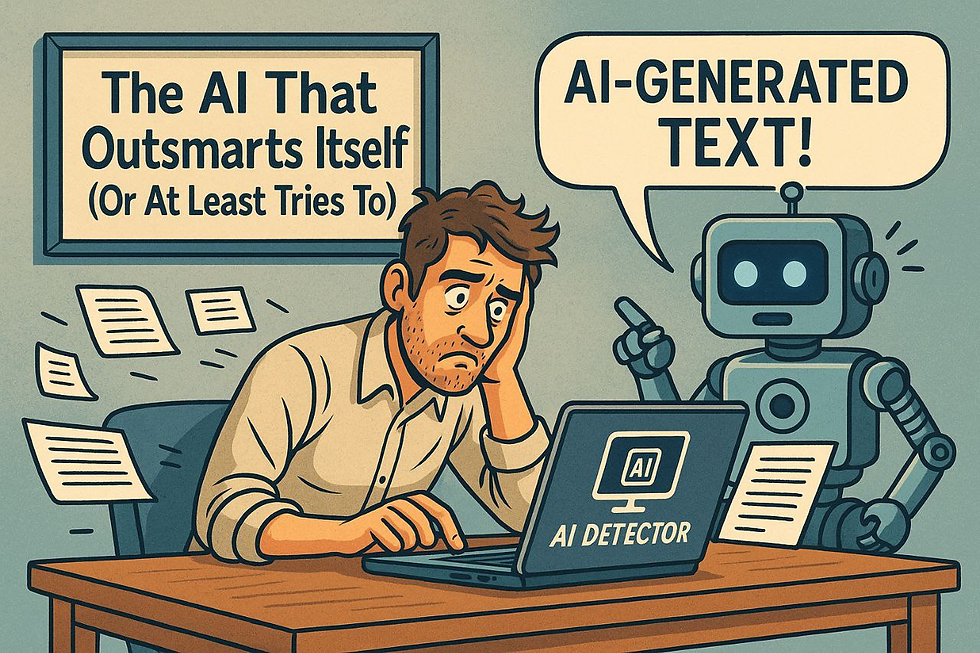The AI Detector Paradox
- Matyas Koszegi

- Jun 6, 2025
- 3 min read
There’s a growing, almost poetic absurdity quietly spreading across the digital plains of the internet. It’s the kind of thing that would’ve made Kafka proud and Orwell mildly amused. I’m talking, of course, about the phenomenon of humans—and hilariously, entire corporations—using AI tools to check if a piece of writing was written by AI.
Yes. You heard that right. In an age where language models have reached uncanny levels of fluency, wit, and (sometimes) unsettling charm, we now have a little ritual. Write something, or have someone write something. Then immediately, run it through an AI detector to find out if it smells... suspiciously non-human. Because nothing screams confidence in human creativity like outsourcing trust to yet another algorithm.
But let’s dig into the paradox properly, shall we?
These “AI detectors” have popped up like mushrooms after a digital rainstorm. OpenAI detector, GPTZero, Turnitin’s AI checker—the names differ, but the promise is the same: we will tell you whether this was written by a soulless silicon entity, or by a Real Human™ (who may or may not have had caffeine and existential dread for breakfast).

But here’s the thing. These detectors? They're hilariously unreliable. In test after test, they have flagged Shakespeare, the US Constitution, and the ramblings of extremely tired students as “likely AI-generated.” Meanwhile, some AI-written texts—crafted with just a touch of chaos and sentence fragments—slip right through as “genuinely human.” Apparently, if you make enough typos or switch topics mid-sentence, the detector throws its hands up and says, “Yeah, that’s human alright. No bot would be this incoherent.”
Let’s be honest: we’re in the middle of a machine-versus-machine arms race. Writers use AI to help with productivity or polish their thoughts, and then other software jumps in to say, “Wait a minute. This smells like Skynet.” The detectors, trained on the same kinds of data, are playing a game of digital guesswork. It's like asking two robots to spy on each other at a party where everyone is wearing the same suit.
But the funniest part? Institutions are taking this extremely seriously.
Universities are implementing AI detection as policy, punishing students based on probabilistic guesses. Employers scan cover letters, assuming that an algorithm can judge sincerity better than a hiring manager. Publishers reject manuscripts because some AI checker got nervous and started seeing bots in every metaphor.
Think about that. We’ve created software so advanced it can write like us—but we’ve now built a second line of software whose job is to freak out and call the first one a liar. Instead of embracing the complexity of collaboration between humans and AI, we’ve panicked and decided that being “too good” at writing must be a red flag.
Is it any wonder that writers—actual humans—are now Googling “how to make writing sound more human so AI detector doesn’t flag it”? What does that even mean? Should we sprinkle in more spelling mistakes? Add vague statements about our feelings? Maybe mention how tired we are of everything? “Today I woke up sad and forgot breakfast. Anyway, here’s my essay on quantum computing.” Perfect. 100% human.
The irony is thick enough to cut with a GPU.
Of course, none of this is to say that academic honesty or authorship verification don’t matter. They do. But what we’re seeing here is another clumsy overreaction—one of those moments where society sees a new technology and responds with pure panic, like someone trying to kill a fly with a bazooka.
Instead of teaching people how to use AI responsibly, we’re sending them the message: “Don’t you dare get help from a tool that was literally built to help you. We want pure, untouched suffering on paper.”
So now we’re in this beautifully broken system: people write, tools write, and tools check if other tools wrote it. And nobody actually knows anything. The result? Trust is outsourced to code, and human judgment is replaced with a probability score. “This was probably written by AI.” Cool. And my lunch was probably a sandwich. Thanks, Sherlock.
The future is here. It’s recursive, ridiculous, and oddly poetic. We’ve trained AI to speak like us. And now we’ve trained AI to snitch on its siblings. Meanwhile, we humans just sit in the middle, wondering if we should be offended that we’re no longer distinguishable from an algorithm.
Bravo, humanity. Bravo.










Comments